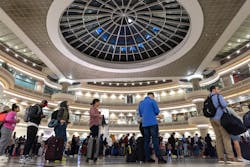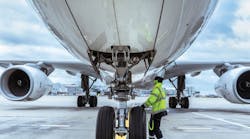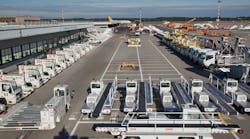Anand Srinivasan was just about to check his baggage for a family spring break trip to Rhode Island, when he discovered the flight had been canceled.
“All of a sudden it became pure pandemonium in the airport” on that Saturday morning at Hartsfield-Jackson International, said Srinivasan, who lives in the Johns Creek area. A storm forecast in the Northeast meant the next available flight for rebooking would cost the family days off their trip. The much-anticipated vacation set for early March was a bust, and Srinivasan was out the cost of his Airbnb booking and airport parking.
Airlines have been working for months to gird for soaring demand, with persistent staffing woes and decades of under-investment in aviation infrastructure threatening to create a repeat of last summer when similar troubles created havoc at airports across the globe. But it turns out, spring is already proving to be a test for airlines and travelers.
This year so far has already brought waves of flight cancellations as storms overwhelmed airlines’ operations, laying bare the limits of the system.
And now air travel volumes this spring are expected to hit an all-time high, surpassing 2019 levels, according to industry group Airlines for America. There will be an average of 2.6 million airline passengers a day from March through April. Hartsfield-Jackson alone is handling 4.4 million passengers from March 26 through April 9, including a mix of spring break vacationers, business travelers and others.
As airlines and air traffic control face the onslaught, analysts fear even more delays, cancellations and traveler frustrations.
To reduce pressures on their operations, airlines are reducing flight schedules and operating 10% fewer flights, Airlines for America said.
Lessons from past meltdowns
Delta had a nightmarish start to the summer travel season of 2022, when the airline quickly became overwhelmed by the volume of passengers filling its terminals and planes. Delta canceled hundreds of flights and admitted that it was under-staffed, and was forced to trim back its flight schedules to a more manageable level.
CEO Ed Bastian said Delta is better prepared this year with thousands of new hires and more pilots going through training.
The airline has planned to restore its flight capacity to pre-pandemic levels by the end of this year. Delta plans to operate more flights out of its largest hub in Atlanta this year and its largest trans-Atlantic flight schedule on record. But the airline says it is also taking a measured approach to prioritize its operations.
Bastian said during an investor presentation that Delta would like to operate more flights. But he raised concerns about “the overall fragility of the aviation infrastructure,” including air traffic control staffing and the limits of Delta’s own workforce, which was cut back severely during the pandemic and now has a quarter of the staff that joined the company over the last two years.
“We’d like to kind of push when the demand is so hot,” Bastian said. But “we can’t. We’re not going to go through a summer like last summer ever again. We’re not going to outstrip our resources.”
Southwest Airlines, the second-largest carrier in Atlanta, ruined holiday trips for many of its customers last December when its operation melted down after a massive snowstorm, prompting a federal probe.
“We’re well underway on a remediation plan,” said Southwest CEO Bob Jordan in March, pointing to investments in new equipment and technology.
But problems stretch beyond the carriers. A nationwide Federal Aviation Administration ground stop in January due to a system outage stranded even more passengers in airports.
“The nation’s airline industry is broken, and it has found us all lurching from crisis to crisis, meltdown to meltdown,” said William McGee, senior fellow for aviation and travel at the American Economic Liberties Project, a nonprofit that advocates for corporate accountability and antitrust enforcement, in written testimony at a hearing on airline consumer protections.
Staffing woes
Whether the industry’s preparations will be enough to handle the onslaught of travelers into spring and summer is yet to be seen.
Already, the FAA has acknowledged that it still has air traffic controller staffing shortfalls and is allowing airlines to operate fewer flights than normally required, with the hope of allowing some operational stability.
One area of concern is New York, where the FAA is projecting delays will increase by 45% this summer compared to summer 2022.
In light of that, Delta said it is “reviewing its network to ensure the best customer experience throughout the summer travel season.”
For airlines, pilot staffing has been a key chokepoint, particularly for regional airlines. Delta and other major carriers have rushed to get pilots trained on specific aircraft after hiring sprees.
A lack of pilots isn’t the only snarl. Association of Flight Attendants International President Sara Nelson said in written Congressional testimony that “almost all domestic flights are staffed with the minimum number of flight attendants, so when something goes wrong there’s no additional crew already in the operation to help staff flights.”
At the gate, “oftentimes one passenger service agent is left to board full planes by themselves,” Nelson testified. “And when a flight gets delayed or canceled that same agent or sometimes no one is left in the terminal to assist passengers.”
Airlines and airports in Europe have had even more severe problems from too-few workers, labor unrest and other issues.
Airports under strain
In the U.S., airport facilities ranging from security checkpoints to parking to concessions are under strain.
At the main security checkpoint at Hartsfield-Jackson, four screening lanes are blocked off for construction, and the Transportation Security Administration is using a three-lane lower-level Terminal North checkpoint in early morning hours for overflow.
While TSA Atlanta Federal Security Director Robert Spinden said the agency has sufficient staffing, he also warned travelers should prepare for up to 30-minute wait times during peak periods, including during spring break.
Concessions lacking workers at Hartsfield-Jackson have operated limited schedules while some locations have not reopened since the pandemic.
“I remember being in the Atlanta airport in one of the busiest concourses and there literally were two retailers that were open,” said U.S. House Aviation Subcommittee Chair Garret Graves, R-Louisiana, during a March 23 hearing on the airline passenger experience.
Outside the terminal, Hartsfield-Jackson has closed off large swaths of the domestic terminal parking deck to shore up the aging structure. The reduction of thousands of parking spots and closures of key airport roadway lanes has aggravated motorists and travelers rushing to catch flights.
Crowded gate areas add to the frustrations and experts say the gap is growing to keep airport infrastructure up to date.
“U.S. terminals are simply outdated and maxed out,” testified Kevin Dolliole, vice chair of Airports Council International-North America, at a Congressional hearing.
Beyond airports, travelers will likely see other staffing woes.
There are 1.7 million jobs open in the leisure and hospitality industry, according to the U.S. Bureau of Labor Statistics’ February employment report. The U.S. Travel Association called that “concerning.”
Srinivasan, the Johns Creek resident whose March trip was canceled, said the hassle and cost was not as bad as the missed opportunity for his family to gather.
“It’s an emotional loss of not being able to spend time together as a family, and canceling all the plans we had of doing things together,” Srinivasan said.
©2023 The Atlanta Journal-Constitution. Visit at ajc.com. Distributed by Tribune Content Agency, LLC.



